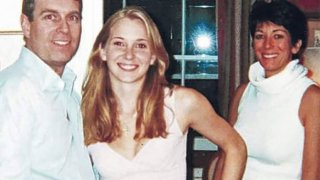
- Prince Andrew lost his bid to dismiss a lawsuit accusing him of having sex with an underage girl, Virginia Giuffre, years ago while she was being sexually exploited by Jeffrey Epstein.
- Andrew, who is a son of Queen Elizabeth II, had been a longtime friend of Epstein, an eccentric money manager whom dozens of women say sexually abused them as girls and as young women.
- A federal judge in New York denied the motion to dismiss the suit, saying language in a civil settlement between Epstein and Giuffre was ambiguous in regard to the case before the court.
A federal judge in New York on Wednesday rejected a request by Prince Andrew of Britain to dismiss a lawsuit accusing him of having sex with an underage girl, Virginia Giuffre, years ago while she was being sexually exploited by Jeffrey Epstein.
Andrew, a son of Queen Elizabeth II, had been a longtime friend of Epstein, the late eccentric money manager whom dozens of women say sexually abused them as girls and as young women.
The prince's lawyers had argued in their motion to dismiss Giuffre's lawsuit that a 2009 civil settlement that she signed with Epstein, who paid her $500,000, also bars Andrew from being sued by her for alleged sexual abuse.
That settlement does not identify Andrew, by name, nor does it identify other so-called second parties who could have been a "potential defendant" in a suit by Giuffre for sexual misconduct.
Judge Lewis Kaplan in his ruling Wednesday denying the motion to dismiss said the language in that settlement is ambiguous. As a result, Kaplan ruled, it is an open question whether Andrew is entitled to be released from liability to Giuffre.
"The 2009 agreement is far from a model of clear and precise language," Kaplan wrote in his decision. "Both sides agree that Epstein and Ms. Giuffre agreed to its language. It must have meant something to them. But Ms. Giuffre and the defendant in this case disagree emphatically as to what it meant with respect to both issues."
Money Report
Giuffre's lawsuit alleges she had sex with Andrew while underage at the direction of Ghislaine Maxwell, who weeks ago was convicted in the same courthouse of procuring other girls to be abused by Epstein.
Andrew has denied Giuffre's claims in the civil suit, which seeks monetary damages for battery and intentional infliction of emotional distress. He also has said he does not recall ever meeting her, despite the existence of a photo that shows him in Maxwell's house standing next to Giuffre.
Giuffre alleges that Andrew on one occasion forced her to have sex against her will in Maxwell's London home and that he also abused her on a visit to Epstein's private island, Little St. James, in the U.S. Virgin Islands, in addition to Epstein's residence on Manhattan's Upper East Side. Giuffre says she was 17 years old at the time.
Kaplan did not make a determination in his ruling of whether Giuffre's allegations are true, a question that a jury will decide.
The judge noted several times that under the law, he was required to assume, "for the purposes of this motion [to dismiss] only ... the truth of all of the plaintiff's allegations and to draw in the plaintiff's favor all inferences that reasonably may be drawn from those allegations."
Epstein, 66, died from what has officially been ruled a suicide by hanging in August 2019 in a Manhattan federal jail while awaiting trial on child sex trafficking charges.
In addition to Andrew, Epstein had previously been friends with other wealthy celebrities, including two former presidents, Donald Trump and Bill Clinton.






